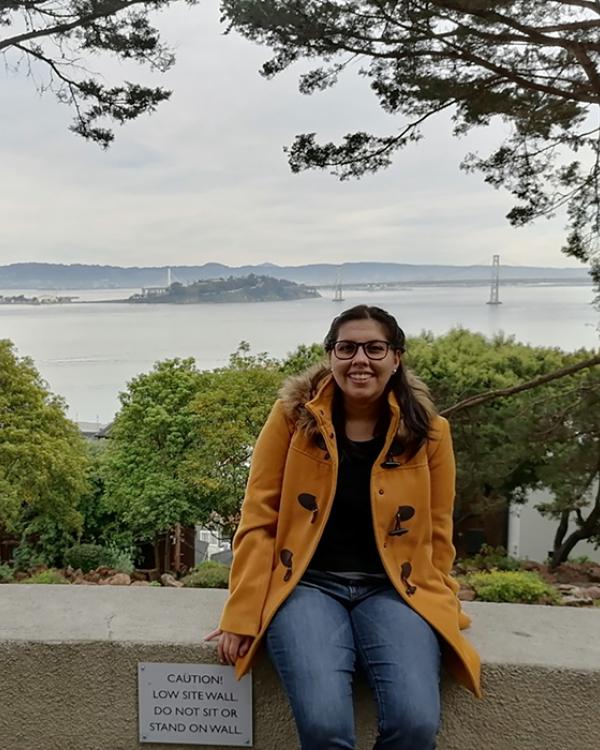
Evelyn Vera Flández is a Chilean graduate student in the Department of Education. Her research interests include foreign-language teaching and applied linguistics. She enjoys working with students whose sociocultural backgrounds have prevented them from having equal education access. She is currently using her research in foreign-language teaching for her independent research project, which has the ultimate goal of exploring and documenting high school Chilean English Foreign Language (EFL) teachers’ use of communicative activities and language exchange in public and subsidized Chilean educational establishments.
GGSE: How have your research findings regarding foreign-language teaching and applied linguistics informed one another?
Vera Flández: Foreign language teaching is a significant educational subject in Chile, which has been addressed from different perspectives that unfortunately haven’t been fruitful as desired. Based on my research findings, especially from what I concluded in my master thesis dissertation, this may be the case because teaching English methodologies are not consistent with teaching purposes and assessment methods. In this context, the courses I’ve taken from the applied linguistics emphasis have helped me learn the importance of rubrics and how to use and include them as an extension of the learning process rather than a punitive tool. In addition, applied linguistics has helped me understand what teaching communicatively means and how it helps students learn a foreign language meaningfully. I am currently using this theoretical framework to write the research proposal for my Independent Research Project (IRP), which has the ultimate goal of exploring and documenting high school Chilean English Foreign Language (EFL) teachers’ use of communicative activities and language exchange in public and subsidized Chilean educational establishments.
GGSE: What did you study during your time as an undergraduate and how did that/those topic/s influence your higher education?
Vera Flández: I did my undergraduate program in Chile, which is my country of origin. It is quite different to be an undergraduate student here than in Chile. To start with, undergrads in Chile don’t have the chance to choose their classes by themselves, as they must follow the curriculum set by each program. In this context, I can say that I studied English foreign language teaching pedagogy within which I had the chance to study English phonetics and syntax, American and British literature, teaching English to children, school management, and general teaching methodologies. I would say that what I studied as an undergraduate not only influenced my higher education but also had an impact on who I am nowadays. I say this because when I started learning English as a foreign language, I didn’t know anything about the language, but I liked it and I did want to learn it. As I didn’t know anything about English, I had many difficulties in passing my courses, particularly during the first term; however, despite the hard times, I was able to learn English. I was and I am amazed at how language learning happens and that is why I am here: to continue learning about it, to research and draw parallels
between how it occurs and how it can be promoted especially when working with students whose sociocultural backgrounds have prevented them from having equal education access.
GGSE: What are some of your most valuable takeaways from your time with UC Santa Barbara’s Department of Education?
Vera Flández: I truly appreciate UCSB’s diversity. The first time I came here, I was impressed by how people look, talk, move, and relate to each other. As time goes by, I have learned that this diversity goes beyond that, as it also has to do with the way people identify themselves and the way they express themselves based on their own histories. It is great for me while being in class to listen to my classmates address different topics from their own backgrounds, since I feel that it opens my mind and enriches my own reflections as well. I think that, by being at UCSB, I am not only nurturing my own interests, but I am also learning about other cultures.
GGSE: What is your favorite way to decompress in the Santa Barbara area after a long week?
Vera Flández: Well, I don’t go out very often. Most of the time, I prefer to stay at home and video chat with my boyfriend who is in Chile. We have been watching Breaking Bad, so I have been investing some time there. Despite this, I do like walking on State Street. I like this street’s vibe. You can see people having a good time and there are some nice shops. Besides this, I really like visiting Stearns Wharf. I live very close to the sea in Chile; therefore, one of the reasons I decided to come to Santa Barbara was that it is close to the sea too, so going there and observing the landscape feels like being at home. In this sense, every time I go there, I think, “Well, I am far away from home, but at least we are still on the same coast.”